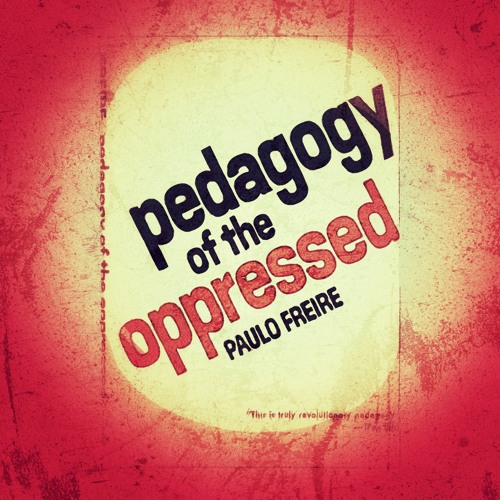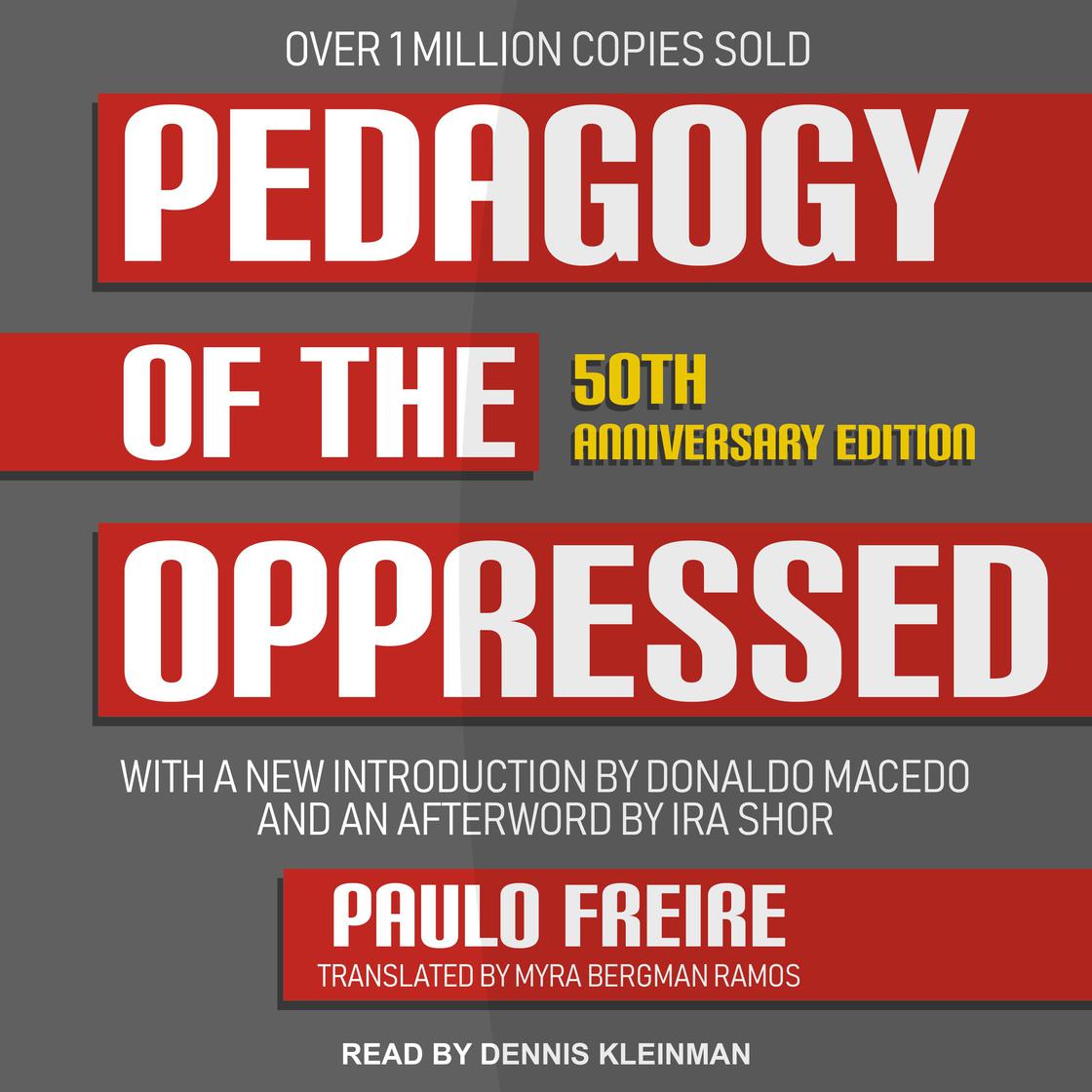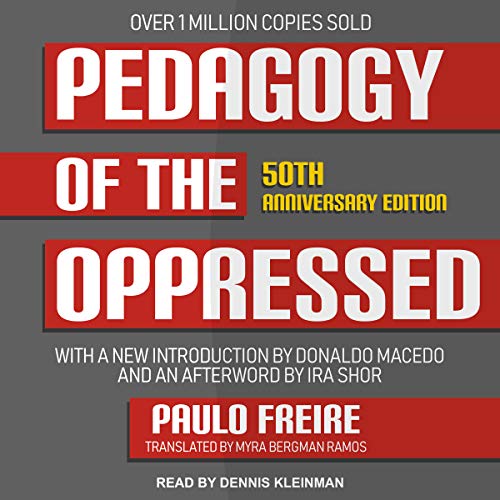“Pedagogy of the Oppressed” by Paulo Freire is a seminal work on critical pedagogy. The audiobook explores themes of education, liberation, and social justice.
Paulo Freire’s “Pedagogy of the Oppressed” revolutionized educational thought. This groundbreaking audiobook delves into the intricate relationship between education and oppression. Freire emphasizes the importance of dialogue in the learning process. He advocates for a pedagogy that empowers learners to question and transform their reality.
By critiquing traditional educational models, Freire encourages a participatory approach. This method fosters critical thinking and social awareness. Educators and activists worldwide find inspiration in Freire’s ideas. His work remains relevant in discussions on educational reform and social equity. Listening to this audiobook offers valuable insights into creating a more just and equitable society.
Introduction To Paulo Freire
Paulo Freire is a renowned Brazilian educator and philosopher. He is best known for his influential book, Pedagogy of the Oppressed. His work revolutionized educational practices worldwide. Freire’s ideas are still relevant today. They inspire educators to think critically about teaching.
Early Life And Influences
Paulo Freire was born on September 19, 1921, in Recife, Brazil. His family experienced poverty during the Great Depression. This early hardship shaped his views on education and social justice.
Freire’s parents emphasized the importance of education. He pursued his studies with dedication. He later attended the University of Recife. There, he studied law, philosophy, and the psychology of language.
| Year | Event |
|---|---|
| 1921 | Born in Recife, Brazil |
| 1943 | Entered University of Recife |
| 1968 | Published Pedagogy of the Oppressed |
Key Philosophies
Freire’s work centers on the concept of “critical pedagogy.” This means teaching should empower students to question and challenge oppression. He believed in a dialogic approach to education. Teachers and students should learn from each other.
Freire introduced the idea of “banking education.” This is where teachers deposit information into passive students. He opposed this method. Instead, he promoted “problem-posing education.” This method encourages active learning and critical thinking.
- Critical Pedagogy: Education should promote social justice.
- Dialogic Learning: Teachers and students learn together.
- Problem-Posing Education: Encourages critical thinking.
Freire’s philosophies continue to influence modern education. They inspire educators to create more inclusive and engaging classrooms.
The Genesis Of ‘pedagogy Of The Oppressed’
Paulo Freire’s ‘Pedagogy of the Oppressed’ is a revolutionary work. It challenges traditional education systems. This audiobook brings Freire’s ideas to life. Let’s explore its origins and objectives.
Historical Context
Freire wrote this book in the 1960s. The world was facing many changes. There were movements for civil rights and social justice. Freire lived in Brazil. His country had many poor people. They had little or no education. Freire wanted to help them.
He saw that traditional education was not working. It treated students like empty vessels. Teachers filled them with knowledge. Freire believed this method was oppressive. It kept people from thinking for themselves. He wanted to change that.
Main Objectives
- Empowerment: Freire aimed to empower the oppressed. He wanted them to see themselves as capable.
- Critical Thinking: He promoted critical thinking. He encouraged students to question what they learned.
- Dialogue: Freire valued dialogue. He saw it as a tool for learning and change.
- Transformation: His goal was to transform society. He wanted a world where everyone could participate equally.
Freire’s approach was different. He saw education as a path to freedom. His ideas have inspired many educators and activists. Listening to the ‘Pedagogy of the Oppressed’ audiobook can be a transformative experience.
Core Concepts Explained
Paulo Freire’s Pedagogy of the Oppressed is a seminal work in education. The audiobook version brings his ideas to a wider audience. This section explains the core concepts of his philosophy.
The Banking Model Of Education
Freire criticizes the traditional education system. He calls it the Banking Model of Education. In this model, teachers deposit information into students. Students are passive recipients. This method stifles creativity and critical thinking.
Freire argues that education should be interactive. Students should question and explore. This way, they become active participants in their learning journey.
Consciousness And Praxis
Freire introduces the concept of consciousness. This means being aware of social and political realities. He believes that education should awaken this consciousness.
Freire also emphasizes praxis. Praxis is the act of applying theory to practice. It involves reflection and action. Through praxis, individuals can transform their world.
In summary, Freire’s ideas challenge traditional education. They promote active learning and social change.
Dialogue As A Tool For Liberation
Paulo Freire’s Pedagogy of the Oppressed is a groundbreaking work. The audiobook version brings his revolutionary ideas to life. One of the core concepts is dialogue as a tool for liberation. Freire emphasizes that genuine dialogue can transform education. It shifts the power dynamics between teacher and student.
Breaking The Teacher-student Dichotomy
Freire challenges the traditional teacher-student relationship. In this model, the teacher is the sole authority. The student is a passive recipient of knowledge. Freire calls this the “banking model” of education. He argues that this approach dehumanizes students.
In contrast, Freire advocates for a co-learner model. Here, both teachers and students engage in a mutual exchange of knowledge. This breaks down hierarchical barriers. It fosters a more inclusive learning environment.
In a dialogue-based education, students become active participants. They contribute their own experiences and insights. This enriches the learning process for everyone involved.
Creating A Problem-posing Education
Freire’s idea of problem-posing education is revolutionary. Instead of memorizing facts, students engage with real-world problems. They critically analyze these issues and seek solutions. This method encourages critical thinking and creativity.
The problem-posing model transforms the classroom. It becomes a dynamic space for discussion and reflection. Teachers and students collaborate to explore various perspectives.
This approach empowers students to think independently. It prepares them to tackle challenges in the real world. They become active agents of change, not passive consumers of information.
Freire’s concepts are more relevant today than ever. The audiobook of Pedagogy of the Oppressed makes these ideas accessible. It invites listeners to rethink traditional education. Through dialogue and problem-posing, education can become a tool for liberation.
Criticism And Controversies
Paulo Freire’s Pedagogy of the Oppressed has sparked numerous debates. While praised by many, it has not escaped criticism and controversies. This section delves into the key areas of criticism.
Academic Debates
Freire’s ideas have ignited fierce academic debates. Some scholars laud his approach as revolutionary. They believe it empowers the marginalized. Others argue it lacks practical application.
Critics claim that Freire’s theories are too idealistic. They say his methods are hard to implement in real classrooms. They also question the feasibility of his dialogical method.
Supporters counter that Freire’s work offers hope. They argue it challenges traditional educational norms. They see it as a call for change.
Here is a quick comparison:
| Supporters’ Views | Critics’ Views |
|---|---|
| Empowers marginalized | Too idealistic |
| Challenges traditional norms | Hard to implement |
| Offers hope for change | Lacks practical application |
Political Reactions
Freire’s work has also drawn political reactions. Some governments view it as subversive. They fear it might incite rebellion.
In some countries, his books are banned. Authorities see his ideas as a threat. They worry it might disrupt the status quo.
On the other hand, activists embrace Freire’s teachings. They use his ideas to advocate for social justice. They believe it can lead to systemic change.
Here are some political reactions:
- Some governments ban the book.
- Authorities view it as a threat.
- Activists use it for social justice.
Freire’s Pedagogy of the Oppressed remains influential. Its impact is both praised and criticized. This makes it a subject of ongoing debate.

Impact And Legacy
Paulo Freire’s Pedagogy of the Oppressed is a groundbreaking book. It has shaped education and social justice worldwide. The audiobook version brings Freire’s ideas to a new audience. Let’s explore its impact and legacy.
Influence On Modern Education
The book has had a profound impact on modern education. Freire emphasized the importance of critical thinking. He encouraged dialogue between teachers and students. This approach fosters a more engaging learning environment.
Many educators today use Freire’s methods. They focus on empowering students rather than just delivering information. This shift has led to more interactive and student-centered classrooms.
Freire’s ideas have also influenced adult education. Programs for adult learners often incorporate his principles. These programs aim to develop critical awareness and promote social change.
Global Reception And Adaptations
Pedagogy of the Oppressed has been translated into many languages. Its message resonates with people across the globe. The audiobook version makes it accessible to even more listeners.
Different cultures have adapted Freire’s ideas to their contexts. In Latin America, his methods are used in grassroots education movements. In Africa, educators apply his principles to address social inequalities.
The book’s impact extends beyond education. Activists and social movements worldwide draw inspiration from Freire’s work. His ideas continue to inspire efforts for social justice and equality.
| Region | Adaptation |
|---|---|
| Latin America | Grassroots education movements |
| Africa | Addressing social inequalities |
| Asia | Community-based learning initiatives |
The audiobook of Pedagogy of the Oppressed continues Freire’s mission. It spreads his transformative ideas to a wider audience. This ensures his legacy endures for future generations.
Listening To The Audiobook
Paulo Freire’s “Pedagogy of the Oppressed” is a powerful read. The audiobook format brings a new dimension to this classic text. Here, we explore the narration and tone, and the benefits of the audiobook format.
Narration And Tone
The narration of the audiobook is clear and engaging. The narrator’s voice captures the essence of Freire’s words. The tone is respectful and serious, fitting the subject matter. This makes listening a profound experience.
- Clarity: The narrator speaks clearly and slowly.
- Emotion: The narration conveys the emotions behind the text.
- Consistency: The tone remains consistent throughout the audiobook.
Listeners feel connected to the content. This makes the complex ideas easier to understand. The narrator’s tone helps maintain the listener’s interest.
Benefits Of The Audiobook Format
The audiobook format offers many benefits. It allows you to absorb Freire’s ideas on the go. You can listen during commutes or while doing chores.
- Convenience: Listen anywhere, anytime.
- Multitasking: Combine listening with other activities.
- Accessibility: Easier for those with reading difficulties.
Listening can make complex concepts more digestible. The narrator’s voice adds a human touch to the ideas. This helps listeners grasp Freire’s philosophy better.
Below is a table highlighting the key benefits:
| Benefit | Explanation |
|---|---|
| Convenience | Listen anywhere, anytime |
| Multitasking | Combine listening with other tasks |
| Accessibility | Great for those with reading challenges |
The audiobook format makes Freire’s work more accessible. It allows more people to engage with his transformative ideas. Listening to “Pedagogy of the Oppressed” can be a life-changing experience.

Exploring Further
Paulo Freire’s Pedagogy of the Oppressed audiobook offers a deep dive into revolutionary education. This section will help you explore more about Freire’s impactful work. You will find related readings and modern applications of his ideas.
Related Readings
To better understand Freire’s teachings, consider these related readings:
- Education for Critical Consciousness by Paulo Freire – This book dives into the idea of critical thinking.
- Teaching to Transgress by bell hooks – It builds on Freire’s ideas and explores feminist perspectives.
- Critical Pedagogy by Joe L. Kincheloe – This work discusses applying Freire’s methods in today’s world.
These books can enrich your understanding of Freire’s concepts. They offer various perspectives and applications.
Applying Freire’s Ideas Today
Freire’s ideas remain relevant in modern education. Here are a few ways to apply his concepts today:
- Encourage Critical Thinking – Promote questioning and analysis in classrooms.
- Foster Dialogue – Create spaces for open, respectful conversations.
- Emphasize Social Justice – Integrate discussions about equality and fairness in lessons.
These methods can help create more engaged, thoughtful students. They align with Freire’s vision of education as a tool for empowerment.

Frequently Asked Questions
What Is “pedagogy Of The Oppressed” About?
“Pedagogy of the Oppressed” explores the dynamics between teachers and students. Paulo Freire emphasizes dialogical education, where both parties learn collaboratively.
Who Is Paulo Freire?
Paulo Freire was a Brazilian educator and philosopher. He is best known for his influential work on critical pedagogy and education for social justice.
Why Listen To The Audiobook?
Listening to the audiobook allows for convenient learning. It provides access to Freire’s ideas while multitasking or commuting.
How Long Is The Audiobook?
The length of the audiobook varies by publisher. Typically, it ranges from 8 to 10 hours, depending on the narration speed.
Conclusion
Paulo Freire’s “Pedagogy of the Oppressed” audiobook provides deep insights into educational transformation. It challenges traditional teaching methods, promoting critical thinking. This essential listen empowers educators and learners alike. Dive into this transformative experience to understand how education can truly liberate.
Explore its profound impact and elevate your educational approach today.



